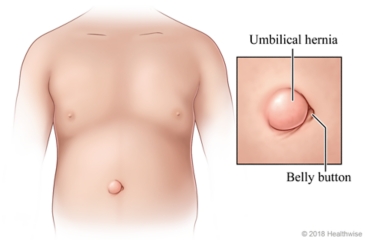Umbilical Hernia Repair: Before Your Surgery

What is an umbilical hernia repair?
An umbilical hernia repair is surgery to fix a hernia. A hernia is a bulge under the skin in your belly. An umbilical hernia is near the belly button (navel). It's a weak spot in your belly muscles that allows tissues or a piece of your intestines to poke through your muscles. It can cause pain. You may notice the pain most when you lift something heavy.
To fix the hernia, the doctor will do one of two kinds of surgery. In open surgery, the doctor makes one cut (incision) near the hernia. In laparoscopic surgery, the doctor makes several small cuts and uses a thin, lighted scope and small tools. Then the doctor pushes the bulge back in place, if needed. Often the doctor patches the weak spot with a piece of mesh material.
Open surgery leaves a single scar. Laparoscopic surgery leaves several smaller scars. The scars fade with time.
You will probably need to take 2 to 3 days off from work. But if your job requires heavy lifting or other physical work, you may need to take 4 to 6 weeks off.
How do you prepare for surgery?
Surgery can be stressful. This information will help you understand what you can expect. And it will help you safely prepare for surgery.
 Preparing for surgery
Preparing for surgery
- Be sure you have someone to take you home. Anesthesia and pain medicine will make it unsafe for you to drive or get home on your own.
- Understand exactly what surgery is planned, along with the risks, benefits, and other options.
- Tell your doctor ALL the medicines and natural health products you take. Some may increase the risk of problems during your surgery. Your doctor will tell you if you should stop taking any of them before the surgery and how soon to do it.
- If you take a medicine that prevents blood clots, your doctor may tell you to stop taking it before your surgery. Or your doctor may tell you to keep taking it. (These medicines include aspirin and other blood thinners.) Make sure that you understand exactly what your doctor wants you to do.
- Make sure your doctor and the hospital have a copy of your advance care plan. If you don't have one, you may want to prepare one. It lets others know your health care wishes. It's a good thing to have before any type of surgery or procedure.
What happens on the day of surgery?
- Follow the instructions exactly about when to stop eating and drinking. If you don't, your surgery may be cancelled. If your doctor told you to take your medicines on the day of surgery, take them with only a sip of water.
- Follow your doctor's instructions about when to bathe or shower before your surgery. Do not apply lotions, perfumes, deodorants, or nail polish.
- Do not shave the surgical site yourself.
- Take off all jewellery and piercings. And take out contact lenses, if you wear them.
 At the hospital or surgery centre
At the hospital or surgery centre
- Bring a picture ID.
- The area for surgery is often marked to make sure there are no errors.
- You will be kept comfortable and safe by your anesthesia provider. You will be asleep during the surgery.
- The surgery will take about 1 to 2 hours.
When should you call your doctor?
- You have questions or concerns.
- You don't understand how to prepare for your surgery.
- You become ill before the surgery (such as fever, flu, or a cold).
- You need to reschedule or have changed your mind about having the surgery.
Current as of: July 31, 2024
